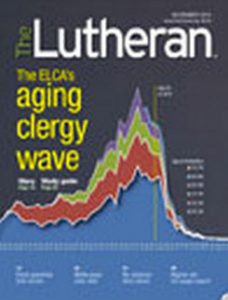 The youngest Baby Boomers reached retirement age in 2011. 10,000 Boomers a day will hit that milestone every day through the year 2030. While not all will retire upon turning 65, it is reasonable to expect a good number will retire at some point not long thereafter.
The youngest Baby Boomers reached retirement age in 2011. 10,000 Boomers a day will hit that milestone every day through the year 2030. While not all will retire upon turning 65, it is reasonable to expect a good number will retire at some point not long thereafter.
Clergy Retirement Boom
Charles M. Austin’s cover story in the latest edition of “The Lutheran,” illustrates the significance of Boomer retirements in the life of the Lutheran church. More specifically, he cites statistics from multiple synods indicating that nearly half of all active clergy are currently at least fifty-five years of age. Given this reality, “the bulge in retirements over the next few years is — statistically at least — a sure thing.”
So What?
It is reasonable to expect a large number of Baby Boomer clergy (as well as the remaining clergy from Greatest Generation) will retire in the coming decades as they reach retirement age. Given their relatively large size when compared to all clergy, this shift should result in a much greater stratification of clergy leadership in congregational contexts for the foreseeable future.
In my own recent experience, most of the clergy I have followed or worked closely with have been age 60 or better. This list includes the pastor I followed in my last interim, the pastor I filled in for this summer, and two of the three clergy in the congregation I presently serve.
Austin concludes his article by suggesting that soon most pulpits will be filled by pastors born after 1975. How do you envision such a shift impacting what it means to be the church (in the context of a single congregation? in a universal sense)?
What might your conference, association, network, denomination or larger entity do to proactively prepare a new generation of leaders? (Check out this brief article to see how the United Methodist Conference with the highest percentage of clergy under age 35 is addressing this matter.)